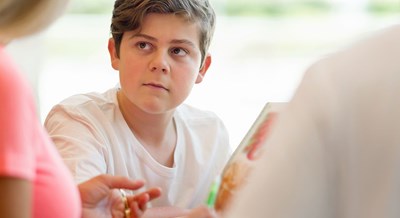
How do we talk to our children and young people about acts of terror and support them with their emotions over them? Child psychologist Paul Gilligan explores.
In the wake of the bombing of an Ariana Grande concert in Manchester, child psychologist and Chief Executive Officer of St Patrick's Mental Health Services, Paul Gilligan, explores.
Emotional impact
By its nature, the horrendous act in Manchester will have the greatest emotional effect on teenagers. They will relate to being at a concert and the fear, chaos and devastation an act like this would create. They will empathise fully with the young people killed or injured and understand the premature robbing of their lives and the effect the injuries will have on their dreams and aspirations.
Making the awfulness more apparent will be the fact that Ariana Grande played a concert here in Ireland last weekend to an audience consisting mainly of first, second and third year secondary school students. The realisation that many of those killed and injured, like those attending in Dublin, will have been attending their first concert, will add significantly to the distress felt.
Most teenagers, by virtue of their age, will still be grappling with the nature and understanding of death and of disability. Finding meaning, if any can be found, in such circumstances is particularly difficult and they need their parents, their teachers and their carers to help them resolve the emotional impact.
Of course, for parents trying to find a meaning for themselves, let alone trying to help their young son or daughter, understanding such events will be extremely challenging. They will also relate directly to the young lives lost or changed forever and in particular to the parents of those directly affected.
Appropriate support
This is a time when we have to make ourselves emotionally available to our young people. Giving them space to talk about the events, helping them reason out their own understanding of what has happened and why is essential. Helping them to resolve their feelings of shock, anger and sadness, while not getting emotionally stuck, is the real challenge.
Providing the appropriate support will involve us allowing our young person to talk about what has happened and how they feel, no matter how upsetting we find this. It will also require us to step back, being sure we don’t force our son or daughter to talk if they don’t want to, and remembering they may express their feelings in other ways.
Discussing our own feelings in an open honest way while trying to balance our emotions will help. Allowing our son or daughter to reason things out for themselves, rather than imposing our interpretation of events, will be important to the process. Enabling our young person to find balance will be crucial. Sometimes they will feel guilty about doing nice things, so it is important to give them permission.
Emotional health
Underpinning all of this we will need to remember the principles of helping our children and teenagers to stay emotionally healthy:
- supporting them to feel good about themselves
- guiding them to be able to see happiness
- letting them know they are loved
- ensuring they feel safe and secure.
Every detail of what happened will be available on social media and our young people will be spared nothing. Any attempts by parents to protect them from this exposure will most likely be unsuccessful and so it will be important to know what is out there and to try and direct them to the most balanced coverage.
These events will undoubtedly raise moral questions, the wrongness of random murder, the reasons why a person might perpetrate such acts. Reaching personal understandings on these issues not only helps young people emotionally resolve them, but is also an important aspect of developing as a person. As parents our role in this process is to support and guide and to avoid imposing our beliefs on them.
Coming in the middle of exam time, parents will worry that their son or daughter will be distracted and lose focus, but often such events work in the opposite way, easing stress and helping to put things into perspective.
Balance and strength
Naturally, most parents will become more protective of their children and teenagers. The already existing worries we have about letting them go to concerts and public events will be exacerbated by the thoughts that no event is safe from random acts of terror anymore. But we need to take stock and to balance these worries with the importance of allowing children to be children, allowing teenagers to be teenagers. We cannot address the physical impact of such an act of terror, but we can manage the psychological impacts.
For the young people and parents directly affected, we can only hope that they will find the strength at some time to resolve what for most of us seems unresolvable. We cannot truly relate to their losses, but can only hope that they in some way may take comfort from the shared pain we all feel. For the young people lost, we must take comfort in hoping that they lived their short lives fulfilling their aspirations and dreams.
Continue to…
Answering children’s questions about the Manchester Terrorist Attack

